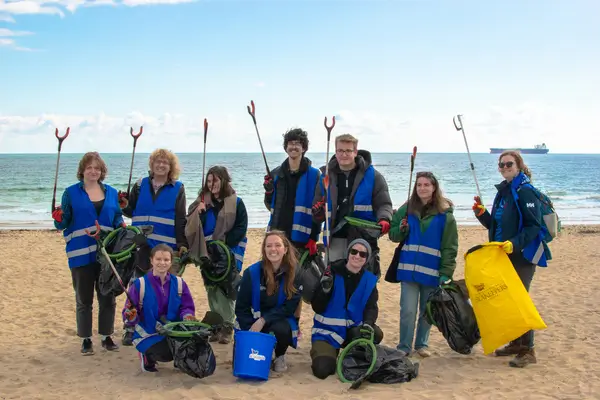Life's a Beach Cleanup at Gyllyngvase Beach, Falmouth
Falmouth, Cornwall
March 15, 2025
Overview
On the March 15, The International SeaKeepers Society attended a Beach Clean-up Hosted by Life’s a Beach at Gyllyngvase Beach in Falmouth, Cornwall, UK. Students from the University of Exeter and University of Falmouth's Eco, MarineWatch and GEMS (Geography, Environmental and Marine science) Societies collected and removed 19.82kg (43.7 pounds) of litter from the beach. A significant amount of the waste collected was plastic from everyday items such as Wrappers and Coffee cup lids. These items have the potential to significantly contribute to the microplastics problem the oceans face while they degrade in the marine environment into many smaller pieces of plastic which can make their way into organisms. Reducing consumption of single use plastics would help reduce this problem. We also introduced the volunteers to the Marine Debris tracker, which they will continue to use in the future to track their collected waste such as this.
We thank Life’s a beach for organising the event and to all the volunteers for joining and helping protect their local marine environment.
Marine Debris Tracker is a data collection app that allows the general public to contribute to an open-date platform and scientific research by recording the different types of litter, specifically plastic pollution, that they find in either inland or marine environments. Marine Debris Tracker was developed by the University of Georgia’s Jambeck Research Group, which SeaKeepers worked with in 2021 when the Jambeck Research Group collaborated with Ocean Conservancy to assess Miami’s plastic waste management, known as a Circularity Assessment Protocol. SeaKeepers again assisted the Jambeck Research Group’s Circularity Informatics Lab in 2022 with another Circularity Assessment Protocol in the Florida Keys. The researchers of the Jambeck Lab use the Marine Debris Tracker app to record their data, and with citizen scientists also using the app, more data can be collected in different areas. Using Marine Debris Tracker at our cleanups involves community members in creating a bigger picture of plastic pollution and provides the means for new scientific findings to be generated as well as for effective local legislation to be informed. SeaKeepers is excited to be incorporating this app at our cleanups and continue our mission of coastal education, protection, and restoration.





















You must be logged in to post a comment.